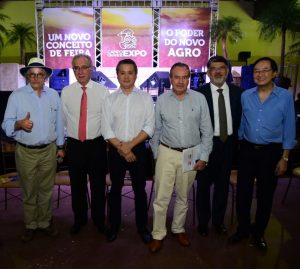São Paulo – Arab Brazilian Chamber of Commerce president Rubens Hannun sat in a panel late this Tuesday afternoon (28) on the challenge of doubling the size of Brazil’s agribusiness industry in five years’ time, at the opening of industry show Campo Grande Expo in Campo Grande, Mato Grosso do Sul. The event will run until Saturday (June 1).
“The discussion revolved around how to achieve 100% growth in agribusiness within five years,” Hannun told ANBA over the phone. According to him, the panelists agreed that foreign trade is the primary tool towards that goal. The Arab and Chinese markets, which hold the biggest promise for Brazilian agribusiness, were represented in the panel. The chairman of the Brazil-China Chamber of Commerce and Industry, Charles Tang, was part of the discussion.

“The Arab and halal market size really commanded a lot of attention,” said Hannun. Halal goods and services are those that comply with Islamic tradition and are therefore fit for consumption by Muslims.
According to material handed out by the Arab Chamber at the event, the global halal market could be as big as USD 2 trillion by 2022. That includes Arab countries, as well as other Islamic nations and Muslim communities around the world.
The Arab Chamber president said that more than compliance with religions precepts, the notion of halal represents a lifestyle, and the label indicates that attention was paid to sanitary care and quality during manufacturing.
He noted, however, that Brazil needs to work hard in order to increase its market share. “Just selling is not enough; we must enter into partnerships. Brazil could buy more product too,” he argued. Hannun said trade and sanitation agreements must be sought, as well as business missions to Arab countries, all of which are tools for fueling deals.
The importance of strengthening the “Brazil Brand” abroad was also in discussion, as a means of adding value to agricultural products shipped abroad from the country.
Only agribusiness can grow that much

“It is clear that Brazil has the chance to significantly increase its trade with the Arab countries, as well as with China,” said the debate moderator José Luiz Tejon to ANBA by the phone. “To do that, however, Brazil must have a business plan for all markets and different productive chains, as well as the domestic market,” he said. “Otherwise, doubling the size of the agribusiness market is impossible,” he added.
For Tejon, agribusiness is the only Brazilian economy sector with conditions to grow that much in five years. “And if it doesn’t, GDP (Gross Domestic Product) won’t grow enough,” he concluded.
The panel also featured Federation of Agriculture and Livestock of the State of Mato Grosso do Sul (FAMASUL) president Maurício Saito, Chinese bank Haitong Brasil CEO Alan Fernandes, and Lar Cooperativa Agroindustrial president Irineo da Costa Rodrigues.
Translated by Gabriel Pomerancblum & Guilherme Miranda




